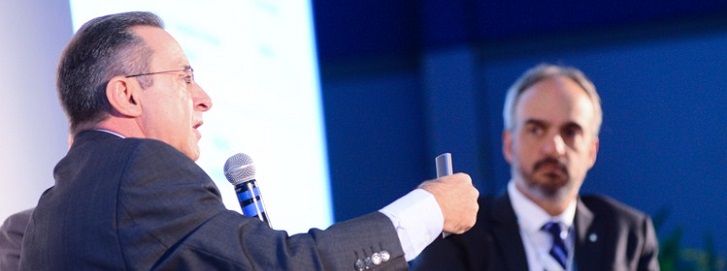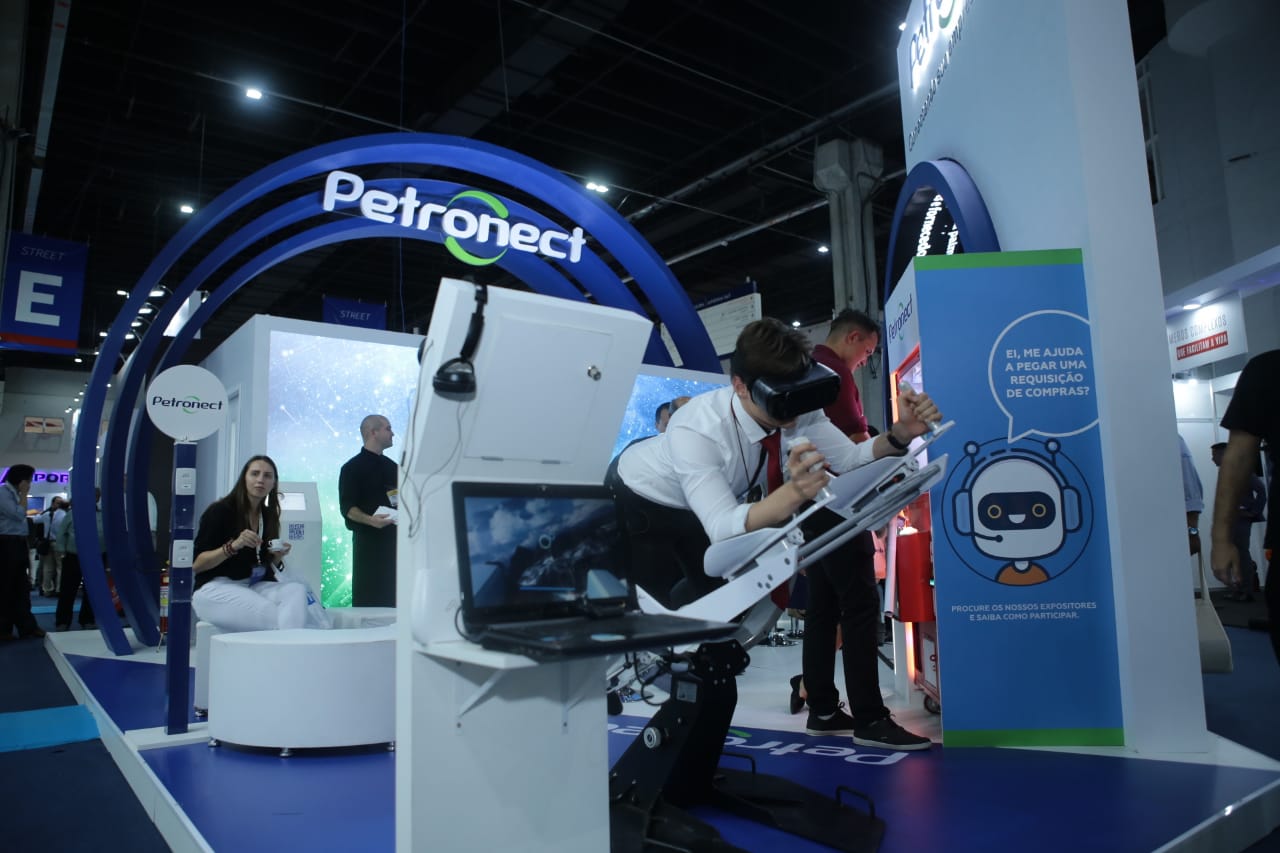Oil and gas experts warn of need to keep costs under control

On the last day of OTC Brasil 2019, the debate focused on the challenges to keep Brazilian oil competitive
The president of the Brazilian Petroleum, Gas and Biofuels Institute (IBP), José Firmo, warned the O&G industry on Thursday about the risk that investments to develop the auctioned areas in recent years will inflate prices again, as occurred at the beginning of the decade. He participated in the panel “How to strengthen the productivity and competitiveness of the oil and gas supply chain”, on the afternoon of the last day of OTC Brasil 2019, and stressed the need to keep costs under control for Brazilian oil to remain competitive in relation to competitors.
“The amount of money attracted to Brazil over the last three years makes everything that was done before seem small. We are doing the right thing and we need to keep doing the right thing”, he said, highlighting the need to take advantage of the current moment to integrate fact the whole chain to the global market. “A real market opening is different from a market opening”, he added.
The IBP estimates that at least 11 FPSOs will be contracted over the next five years. For the president of the Brazilian Association of Petroleum Services Companies (Abespetro), Claudio Makarovsky, Brazilian companies will adapt to meet demand if they know exactly what the demand will be. “We’ve had a lot of bad experiences in the past and we don’t want to repeat it. No one in this room will want to do 18 probes again”, he said.
For Makarovsky, the strategy requires realigning prices and sharing risks between operators and suppliers. “Suppliers need to be engaged earlier in projects and risks and benefits need to be balanced”, he explained.
For Petrobras supply chain director Cláudio de Araújo, the company is prepared to share risks with suppliers as a way to reduce contracting costs. He did not detail how this could be done, but stressed that the company needs to work with more standardized projects as a way to reduce prices.
During the last lecture lunch of OTC Brasil 2019, IBP’s Executive Secretary for Exploration and Production, Antonio Guimarães, spoke about the need for the industry to frame its projects with a breakeven point of less than US$40 per barrel and maintain the balance and sustainability of the projects.
To this end, he said, during the development phase of production it is necessary to seek standardization of platforms and other equipment, to equate the dependence of few suppliers, to maintain a favorable environment of local content rules on a competitive basis, as well as a scenario of fiscal stability and regulatory – which ensured the resumption of auctions. “A competitive local industry with a diversity of suppliers and competition among them is good for the industry and for the country, which will receive major investments in the coming years”, he said.
Digital transformation
Digital transformation is a challenge even for technology companies. This was one of the main messages from the participants of the plenary session on the theme, which ended the programming of OTC Brasil 2019 and was attended by representatives of Google, Amazon, IBM and Microsoft.
For Ana Paula Assis, IBM general manager for Latin America, even in the technology sector, companies that started after the third industrial revolution are taking advantages over those that were already established.
Ana Hofmann of Microsoft’s industry area said the company is studying why disruptive companies like Tesla and Uber are in some cases more efficient than the company. For her, it is clear that it is not for lack of investment in technology. The main problem is in corporate culture. “If you are afraid to make decisions, you will waste time”, he said.
In the case of the industrial sector, however, João Carlos Bolonha, from Google Cloud, also highlighted the need for greater agility in decision making. According to him, companies are looking for new solutions, but very slowly. For Arno Van De Haak, owner of Amazon O&G, the reason is that companies in the industry are very concerned about safety when deciding.
Future Professional
Aimed at young audiences, Professional of the Future reached its 18th edition during OTC Brasil 2019. Under the theme “Changing the Game: New Career Opportunities and the Role of Young People in a Changing Industry”, the event brought together, in part in the morning and afternoon, CEOs, HR leaders, and young professionals address the impacts that the resumption of investments in the industry, the energy transition, and technological advances can have on the job market.
According to Eduardo Chamusca, country director of SBM Offshore in Brazil, unlike the service industry, which has more disruptive business models such as Uber, the energy world requires hardware. “So don’t ask yourself too much whether your decision to work in the O&G, energy, or anything engineering industry is right or wrong. Demand will always exist for smart people”, he said.
Jaume Vergés, PetroRio’s HR, Innovation, Management, IT and Administration manager, pointed out some of the soft skills valued by employers that can be amplified or developed over time, such as imagination, creativity, curiosity, empathy and resilience, as well as emotional and social intelligence, teamwork, and critical and adaptive thinking.
“You have the references. You are ready, have the technical knowledge to enter the market”, he said, pointing to consultancies, startups – or companies that have such a culture – and large and dynamic organizations as the three most suitable profiles for young people to develop these skills early in their careers.
Exhibition Area
The National Agency of Petroleum, Natural Gas and Biofuels (ANP) is present at the exhibition with a daily schedule of lectures, covering topics ranging from RD&I clause and regulatory improvements to the exploration phase in E&P contracts in Brazil. The Agency promotes next week the mega auction of surplus assignment on 6/11 and the 6th Round of pre-salt sharing on 7/11.

The technology is present at the Petronect booth, B2B shopping portal, which focuses on the user experience. The company brings two activations, including that of a flight simulator. To participate, the visitor must read the trip briefing and check in with the company’s electronic signature technology.
The IBP booth welcomed Raquel Filgueiras, senior economist in the Institute’s Economic Analysis area, to talk about the oil and gas industry and its relevance to Rio de Janeiro. With 30 percent of its industrial GDP and 24 percent of its 2018 revenue going to the O&G sector, the state is Brazil’s largest oil exporter and has proven reserves larger than Mexico’s. The expert also addressed forecasts of peak global oil demand, according to key market players, and upstream investments in the country.
Offshore arena
Operating companies operating in Brazil met at the FPSO offshore arena on the second day of OTC Brasil 2019, where they discussed trends for investment, competitiveness, contracting and financing.
Soichi Ide of MODEC spoke about the challenge of digitizing FPSO operations. He explained the process focused on automation in which a new infrastructure was built to enable rapid and scalable analysis. At the same time, he said, “we’ve changed the way we work to an agile model when the product is useful from the earliest stage of development.” In line with this, the company has developed a predictive model to maintain a continuous cycle of operations. “Our focus is to collect data so we can predict the risks”, Ide explained.
OTC Brasil is sponsored by Petrobras, Equinor, ExxonMobil, Shell, BP, Chevron, Petrogal, Total, Repsol Sinopec, TechnipFMC, Vallourec, PetroRio, Aker Solutions, Frank’s International, Maha Energy Brazil, Shawcor, Solvay, Halliburton, Enauta and MOL.